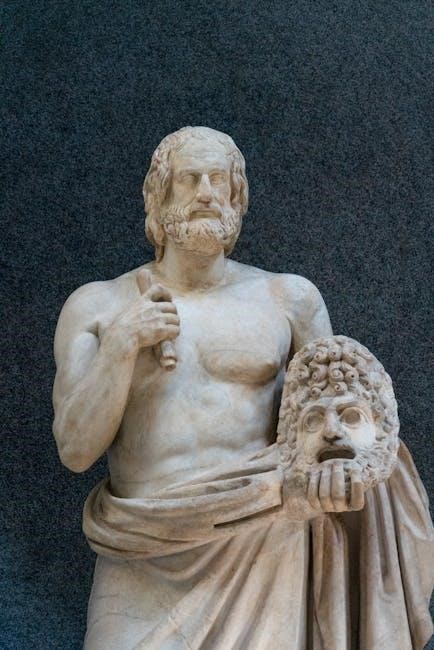Euripides’ Medea is a timeless tragedy exploring themes of revenge, betrayal, and gender roles. The play masterfully portrays Medea, a powerful yet flawed heroine, driven by betrayal to commit horrific acts, sparking debates on morality and justice in ancient Greek society.
1.1 Title: “Medea by Euripides: A Tragic Exploration of Revenge and Betrayal”
The title reflects the play’s core themes, emphasizing Medea’s tragic journey from betrayal to devastating revenge. Euripides masterfully portrays Medea as a complex heroine, blending emotional depth with moral ambiguity. The phrase “tragic exploration” highlights the psychological and societal tensions driving her actions, setting the stage for a gripping examination of human nature and justice.
Medea by Euripides is a masterful tragedy that explores themes of revenge, betrayal, and the complexities of human emotion. Written around 431 BCE, the play revolves around Medea, a powerful sorceress, and her devastating response to her husband Jason’s infidelity. This ancient Greek drama delves into the tensions between love, honor, and societal expectations, offering a profound commentary on the human condition and the role of women in a patriarchal world.

Historical Context of the Play
Euripides’ Medea was written in 431 BCE, during a time of great cultural and political change in Athens. It reflects the tensions of the Peloponnesian War and explores themes relevant to Athenian society, offering a unique perspective on gender roles and justice.
2.1 Ancient Greek Theatre and Euripides’ Role
Ancient Greek theatre was a cornerstone of cultural expression, with tragedy serving as a medium for exploring human suffering and moral dilemmas. Euripides, one of the three great Athenian tragedians, alongside Aeschylus and Sophocles, innovated the genre by introducing complex characters and psychological depth. His works, including Medea, challenged societal norms, particularly in their portrayal of women, and explored themes of justice, revenge, and divine intervention. Euripides’ plays often questioned traditional values, making him a pioneer in dramatic storytelling and intellectual inquiry.
2.2 The Myth of Medea and Its Cultural Significance
Medea, a sorceress and princess of Colchis, is a central figure in Greek mythology, known for her intellect and magical powers. Her story, rooted in betrayal and revenge, has captivated audiences for centuries, symbolizing the destructive power of love turned to hatred. Medea’s myth transcends time, reflecting societal fears about female agency and the consequences of unchecked emotions, making her a timeless symbol of both femininity and fury in Western cultural heritage.
Plot Summary
Medea, betrayed by Jason, seeks revenge by murdering his new bride and their children, unleashing a tragic chain of events driven by rage and heartbreak.
3.1 The Story of Medea and Jason
Medea, a sorceress and princess, falls in love with Jason, aiding him in retrieving the Golden Fleece. They marry and have children, but Jason betrays her by marrying Creusa. Devastated, Medea exacts revenge by killing Creusa and her own children, showcasing her tragic transformation from loving wife to vengeful outcast, driven by Jason’s betrayal and societal disdain.
3.2 Key Events and Turning Points in the Play
Medea’s discovery of Jason’s betrayal sparks her quest for revenge. She pleads with him to reconsider, revealing her emotional turmoil. The chorus serves as a moral backdrop, heightening tension. Medea sends poisoned gifts to Creusa, killing her and Creon. In a climactic moment, Medea murders her children to deny Jason a legacy. Her escape in Helios’ chariot underscores her divine connections, leaving Jason in despair and solidifying her tragic legacy.
Main Characters
Medea, the vengeful sorceress, Jason, her unfaithful husband, Creon, the ruling king, and the chorus, representing societal norms, drive the tragic narrative of betrayal and revenge.
4.1 Medea: The Tragic Heroine
Medea, a complex and powerful figure, embodies both intelligence and fury. Betrayed by Jason, she seeks devastating revenge, showcasing her emotional depth and moral ambiguity. Her actions challenge societal norms, making her one of Greek tragedy’s most compelling characters, whose story continues to resonate with modern audiences, exploring themes of justice, love, and the consequences of unchecked emotions.
4.2 Jason: The Betrayer
Jason, as the betrayer, represents the essence of disloyalty and ambition. His decision to abandon Medea for another woman triggers her vengeful fury, exposing his flaws as a manipulative and self-serving character. His actions highlight the societal norms of ancient Greece, where men often prioritized power over personal loyalty, leading to devastating consequences for those he betrayed.
4.3 Creon and the Chorus: Supporting Characters
Creon, King of Corinth, embodies authority and societal norms, forbidding Medea’s presence in his kingdom. His rigid stance escalates the conflict, highlighting Medea’s isolation. The Chorus, representing the community, provides moral commentary and emotional depth, reacting to Medea’s plight while striving to maintain order. Their interactions with Medea reveal both empathy and fear, underscoring the tragedy’s moral complexities and societal tensions.
Themes and Motifs
Central themes include revenge, betrayal, and the societal oppression of women, with motifs like poisoned gifts and divine intervention symbolizing Medea’s tragic struggle for justice and identity.
5.1 Revenge and Retribution
Medea’s quest for revenge against Jason drives the play’s tragic momentum. Betrayed and abandoned, she devises a devastating plan to destroy Jason’s new life. Through cunning and sorcery, Medea orchestrates the deaths of Jason’s wife, father-in-law, and even her own children, leaving Jason utterly shattered. Her actions highlight the destructive power of unchecked vengeance, while the Chorus mournfully reflects on the devastating consequences of her retribution, underscoring the futility of such cycles of revenge.
5.2 Betrayal and Deception
Betrayal is a central theme in Medea, as Jason’s abandonment of Medea for Glauce sparks her relentless pursuit of revenge. Medea’s deception, including the poisoned gifts, underscores her cunning and determination to destroy those who wronged her. The play highlights the emotional and moral turmoil caused by betrayal, while Medea’s actions reveal the destructive consequences of deception. Euripides masterfully portrays how betrayal fuels Medea’s transformation from a devoted wife to a vengeful force of nature.
5.3 The Role of Women in Ancient Greek Society
Euripides’ Medea highlights the oppressed status of women in ancient Greece, where they were often treated as commodities. Medea’s struggle reflects the societal constraints placed on women, emphasizing their lack of autonomy and rights. Euripides portrays Medea’s intelligence and agency, challenging the norms of a patriarchal society. Through her tragic story, the play underscores the limited options available to women and the consequences of their marginalization in a male-dominated world.

Symbolism and Imagery
Euripides employs vivid imagery and symbolism to underscore themes. Medea’s chariot, a gift from Helios, symbolizes divine aid and escape. Poisoned gifts and bloodshed represent betrayal and destruction.
6.1 The Chariot of Helios
The chariot of Helios, Medea’s grandfather, symbolizes divine aid and escape. It represents her connection to divine power, enabling her to flee after orchestrating the tragic events. This imagery underscores her cunning and divine heritage, while also highlighting the tragic irony of her ultimate escape, leaving destruction in her wake. The chariot serves as both a literal and symbolic tool, reinforcing Medea’s complex character and the play’s themes of revenge and divine intervention.
6.2 The Poisoned Gifts
The poisoned gifts, a dress and coronet, are central to Medea’s revenge. Disguised as tokens of reconciliation, they are laced with deadly magic. When Glauce dons them, she suffers an agonizing death, and Creon, attempting to save her, also perishes. These gifts symbolize deception and betrayal, highlighting Medea’s cunning and ruthlessness. The poison’s slow, painful effect underscores the horror of her actions, making the gifts a potent symbol of her revenge and its devastating consequences.

The Role of the Chorus
The Chorus in Medea serves as a moral compass, providing commentary on the action and reflecting the emotional tone of the play, while offering context and insights into the characters’ motivations and the unfolding tragedy.
7.1 Function of the Chorus in Greek Tragedy
The Chorus in Greek tragedy serves as a collective voice, providing commentary on the action, reflecting the emotional tone, and exploring themes. They offer insights into the characters’ motivations and the moral implications of their actions, acting as a bridge between the audience and the characters. In Euripides’ plays, the Chorus often delivers choral odes that delve into broader themes, while also offering context and emotional depth to the narrative.
7.2 The Chorus’ Impact on the Play’s Emotional Tone
The Chorus significantly influences the emotional tone of Medea, heightening tension and evoking empathy. Their chants and laments reflect the audience’s collective feelings, amplifying the tragic atmosphere. Through their expressions of pity and fear, the Chorus underscores Medea’s suffering and the moral complexity of her actions, creating a deeper emotional engagement with the audience.

Modern Relevance of Medea
Medea’s themes of revenge, betrayal, and gender roles remain relevant, offering psychological and sociological insights. Modern adaptations in film, theater, and literature highlight its enduring appeal and universal themes.
8.1 Psychological and Sociological Insights
Medea’s psychological complexity offers insights into human motivation, exploring themes of revenge, betrayal, and emotional turmoil. Sociologically, the play examines gender roles and societal expectations, highlighting Medea’s struggle as a woman in a patriarchal society. These themes resonate in modern discussions about domestic violence, mental health, and feminist perspectives, making the play a timeless study of human psychology and societal structures.
8.2 Adaptations and Interpretations in Modern Media
Euripides’ Medea has inspired countless adaptations, including films, operas, and stage productions. The 1969 film Medea, directed by Pier Paolo Pasolini, reimagines the story in a contemporary context. Modern stage productions often reinterpret Medea’s character, emphasizing her psychological complexity. The opera Médée by Luigi Cherubini further explores her tragic depth. These adaptations highlight the timeless appeal of Medea’s story, resonating with modern audiences through diverse artistic mediums.
